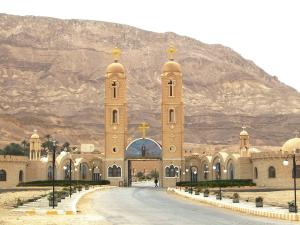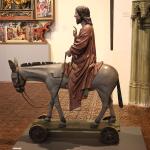
Despite their ascetic discipline, a discipline established to help them pursue the form of holiness connected to their own particular charism, many of the greatest desert fathers and mothers understood that discipline should not get in the way of mercy. They rightfully understood that the promotion of extreme discipline, especially with legalistic rigor, without any notion of mercy, leads to despair. One of the ways abbas and ammas promoted mercy was by making it clear that monastic communities should avoid having a judgmental attitude towards others. Everyone in a particular community has their own problems. Everyone needs mercy. They knew that if they were not capable of showing mercy to others, they should not expect mercy for themselves. This was especially relevant for early monastic communities because the people who joined them came from all walks of life, all kinds of backgrounds, from the rich to the poor, from the noble to the slave, from the law-abiding to the criminal. The monastic community was established as a place where everyone was given a chance to have a new life, to receive the grace and community support needed for them to be successful in their endeavors.
Many who became an abba or an amma lived a life of holiness all their lives; when they became a monk or nun, they merely continued doing what they had always done all their lives. But not all were like this. Many had not lived such a holy or devout life. They came to the monastic community as a way to get away from society. They did so for a variety of reasons, many of which were not initially religious in nature. Some, like St. Moses the Ethiopian, were criminals living on the edge of society; they sought refuge only to find that through that refuge that their lives changed, and changed for the better (often through some sort of encounter or experience with God). Others, such as those who owed money to someone (such as the state), and did not have the means to pay their debt, divested themselves from their secular responsibility by joining a monastic community as a way to preserve their freedom.. Once someone joined a monastic community. they were expected to follow its rules, to transform their lives so that it took on a spiritual nature; and society, in general, allowed them to stay, which is why many, when they felt they had no place to go, would go into the desert and join one of its communities.
Obviously, though mercy was promoted, and much leeway was given to those who became an abba or an amma, they were expected to take on and put into practice ascetic discipline. The community was not anarchial; it had standards, if someone did not follow those standards, they could (but would not always be) cast out; it all depended upon the circumstances and the kind of violation involved. What was key, however, is that the communities were taught to be as merciful as they could, to forgive even violations of the community, and take back lapsed members of the community, if there were indications that the person in question was truly penitent and desired to change their ways and follow the expectations of the community. If, however, it was clear that they were not going to change, but cause great hardship, not only to others, but to themselves, sometimes they would be told to leave and return to where they came from, hoping that they will fare better in secular society, because it was clear that they did not have an ascetic charism.
Thus, when dealing with wayward members of their community, the desert monks and nuns understood that circumstances mattered. There was no one universal rule, but rather, there were many different rules which they used to examine each particular situation, each particular violation of the communities ideals, to determine what would be the best way to handle someone who was causing problems within their community. Though many joined a monastery expecting only the best, only the purest, to be in the community, the reality is that monastic communities, just like secular ones, were filled with a diverse group of people. The thing they had to learn to do was find a way to help those in need of correction; they had to make sure they were not too harsh on them, lest through such harshness, such people found themselves in despair, and through such despair, stopped trying to be better. This is why we will find many stories where a famous desert father or mother took considerable care to help those who were deemed sinners, lifting them up and showing them love and concern instead of being cruel to them, using their sins as an excuse to punish them mercilessly. St. Moses the Ethiopian, for example, said he remembered his own past as a brigand, and so he knew his own sins were following behind him, which is why he believed that he could not judge others who made mistakes but were trying to live out the monastic life the best they could. Another abba, St. Bessarion, famous for his own strict ascetic discipline, likewise understood how difficult the spiritual life could be; he put himself in solidarity with sinners, so that if some sinner were turned away from a church by its priest, Bessarion would leave the church with that sinner: “A brother who had sinned was turned out of the church by the priest; Abba Bessarion got up and went with him, saying, ‘I, too, am a sinner.’”[1]
Bessarion understood that sinners needed to be shown mercy and compassion instead of being cast aside. He knew that he, like the priest, was not perfect. He understood that it was only by helping each other and supporting each other in our weakness, instead of tearing each other down for our petty mistakes, that we could develop spiritually and slowly gain the perfection which we seek. This lesson, though important for the desert community which he was in, is also important for all of us, no matter which kind of charism, which kind of vocation, we have. We all live in our own communities, and in them, we need to know how to show mercy to those who find the standards of the community are hard to achieve. Mercy would be useless if it were only given to those who have already become perfect, for they won’t need it. Jesus explained this in the way he said he came to those who knew they needed a spiritual physician, not those who thought they were holy. And for us, Bessarion understood, this meant we should stop looking at ourselves and comparing ourselves to others, for once we do that, we begin to find excuses to treat others, or ourselves, poorly: “A brother who shared a lodging with other brothers asked Abba Bessarion, ‘What should I do?’ The old man replied, ‘Keep silence and do not compare yourself with others.’” [2]
The more we compare ourselves to others, the more we either find excuses to belittle them until, at last, we no longer show them mercy, or the more we feel ourselves to be so bad, because we are not like them, we end up in a state of despair. Christians should understand different people will do different things that we are not called to do the exact same things, which is why we should not compare ourselves and our life, and what we feel called to do in it, with the lives of others. Jesus said that there are many different mansions in heaven as a way to point this out. Because we come from different backgrounds, because we possess different abilities, we will find different sins as being more or less challenging for us than others; the way we want mercy for those things which challenge us should help us realize why we should give mercy to others for the challenges they face. The more we understand our own potentialities and needs, and how they make us different from others, the more we will stop trying to universalize our own experience (or the experience of others), judging everyone from such universalizations. We will allow for diversity in society and in doing so, truly allow people to realize their full potential, their own charism. While this understanding was an important part of the desert experience, it is one which we should all have. For if we do so, if we truly realize it and its implications, we will embrace mercy even more, not less, as we will understand how it is needed to deal with the diversity which we find in our community in such a way as to make sure our community flourishes.
[1] The Sayings of the Desert Fathers. trans. Benedicta Ward (Kalamazoo, MI: Cistercian Publications, 1984), 49 [Saying of Abba Bessarion 7].
[2] The Sayings of the Desert Fathers, 49 [Saying of Abba Bessarion 10].
Stay in touch! Like A Little Bit of Nothing on Facebook.
If you liked what you read, please consider sharing it with your friends and family!













